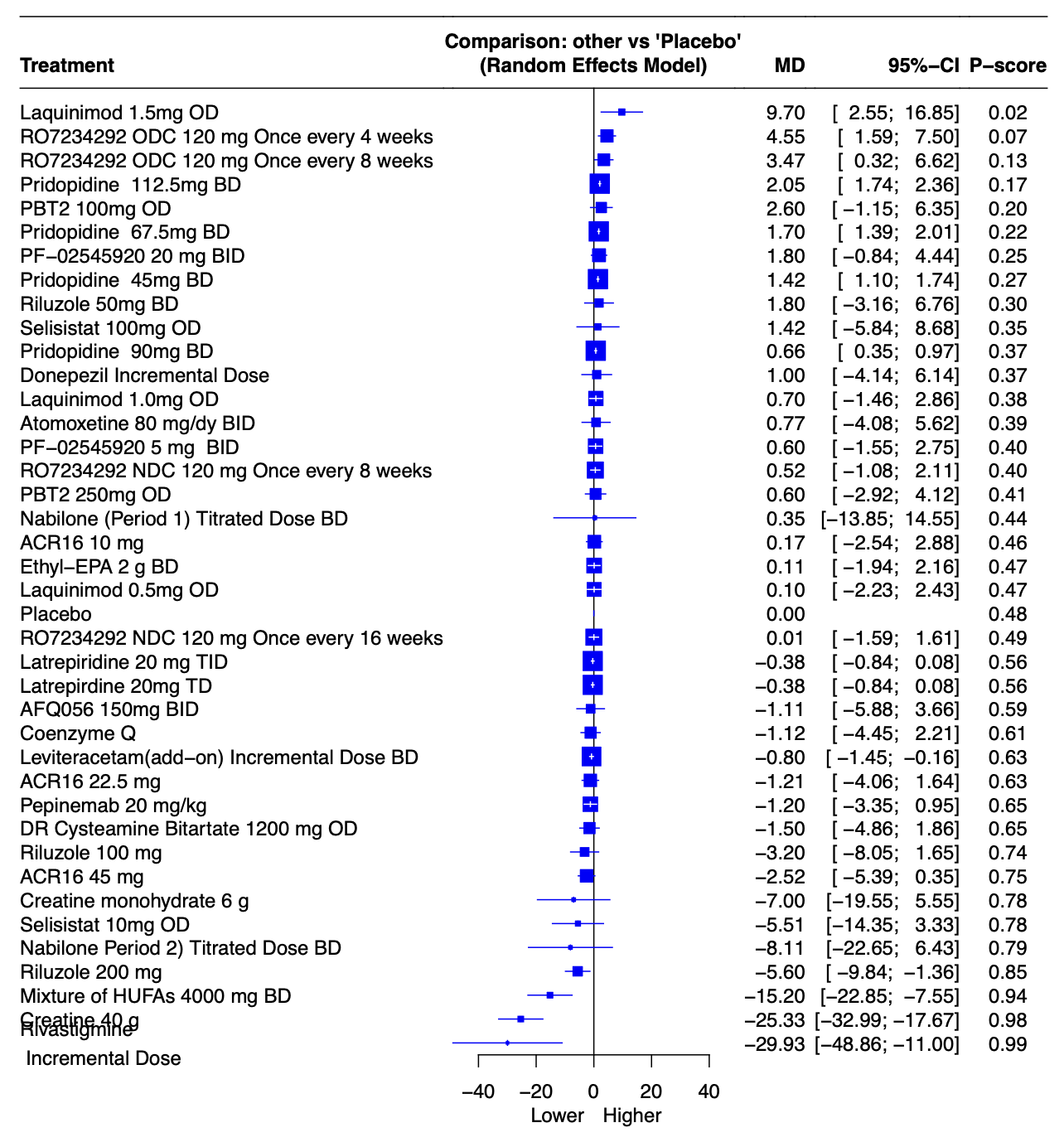Category: Huntington's Disease
Objective: To evaluate and compare the efficacy of pharmacological interventions for Huntington’s Disease through a network meta-analysis, identifying the most effective treatments.
Background: Huntington’s Disease is a rare inherited condition that causes progressive neurodegeneration and affects parts of the brain that regulate voluntary movement and memory. Management includes Counselling, Speech therapy, physical therapy, and Symptomatic management with medications. This Network Meta-Analysis explores the efficacy of different pharmacological therapies and provides insight into their effectiveness in treating Huntington’s Disease(HD).
Method: We systematically searched MEDLINE (PubMed), EMBASE, ScienceDirect, and Scopus using specific search strategies comprising terms related to HD, UHDRS TMS, and Pharmacological therapies from the date of database inception until November 2023. Following PRISMA guidelines, our screening and extraction included RCTs investigating the Efficacy of different pharmacological therapies in treating Huntington’s Disease. Utilizing the ‘netmeta’ R package, we analyzed the mean UHDRS TMS score and standard differences via the random effects model. The primary outcome was the mean difference in the change from the baseline to the last available follow-up scores of the UHDRS TMS for pharmacological therapy and Placebo.
Results: A total of 29 RCTs were included with a pooled population of 4080 patients. UHDRS TMS scores for Laquinimod 1.5mg OD showed a significant mean difference of 9.7 (95% CI: 2.55 to 16.85). RO7234292 ODC 120 mg once every 4 weeks showed a mean difference of 4.55 (95% CI: 1.59 to 7.5). Riluzole 200mg showed a mean difference of -5.6 (95% CI: -9.84 to -1.36). Mixture of HUFAs 4000mg BD showed a mean difference of -15.2 (95% CI: -22.85 to -7.55). Creatine 40 mg showed a mean difference of -25.33 (95% CI: -32.99 to -17.67). Rivastigmine Incremental Dose (1.5 mg BID – 2 months; 3 mg – BID – 22 months) showed a mean difference of -29.93 (95% CI: -48.86 to -11).
Conclusion: Rivastigmine incremental dose (1.5-3 mg BID) , Creatinine (40mg), HUFAs mixture (400mg), and Riluzole (200mg) show significant improvements with regards to UHDRS TMS score, in order of decreasing efficacy. Further research is required to validate these results.
Fig. 1 Forest Plot
To cite this abstract in AMA style:
A. Bhonsale, V. Suresh, B. Javed, M. Shamim, T. Dave, V. Ghosh, S. Sen, M. Muneer, D. Dey, M. Jayan, B. Dhakal, S. Vasipalli, R. Jena. Mapping the Efficacy Landscape: A Network Meta-Analysis of Pharmacological Interventions in Huntington’s Disease [abstract]. Mov Disord. 2024; 39 (suppl 1). https://www.mdsabstracts.org/abstract/mapping-the-efficacy-landscape-a-network-meta-analysis-of-pharmacological-interventions-in-huntingtons-disease/. Accessed February 15, 2026.« Back to 2024 International Congress
MDS Abstracts - https://www.mdsabstracts.org/abstract/mapping-the-efficacy-landscape-a-network-meta-analysis-of-pharmacological-interventions-in-huntingtons-disease/

